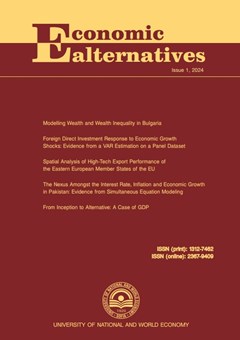Modelling Wealth and Wealth Inequality in Bulgaria
Author: Petar Peshev
Abstract
This paper analyses net wealth and net wealth inequality determinants in Bulgaria, for the 2000-2020 period. The econometric results suggest that the introduction of corporate and individual flat tax rates in 2007 and 2008 contribute to households’ net wealth creation but have no significant association with inequality variables. Interest rates on mortgage loans, cost of debt, budget surpluses and inflation have a negative association with wealth, while the value of houses, arable land, equity, interest income, budget deficits contribute to net wealth growth. The top percentile increases its wealth share supported by the value of houses, equity and positive current account to Gross Domestic Product (GDP) values, however the cost of debt and GDP per capita are in a negative association with top percentile inequality. The bottom half of the population increases its wealth share with higher GDP per capita values and higher consumer loans rates, however inflation affects it negatively. Inflation and investment income are in a positive association with the Gini coefficient, while interest rates on consumer loans, cost of debt, GDP per capita, Government revenues, dividend income, equity, and the value of houses reduce inequality.

